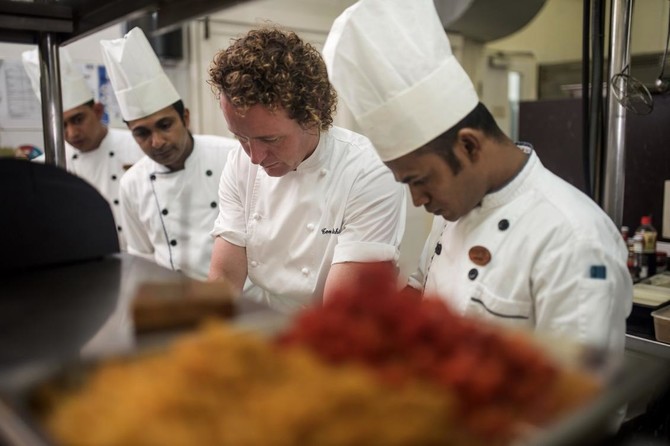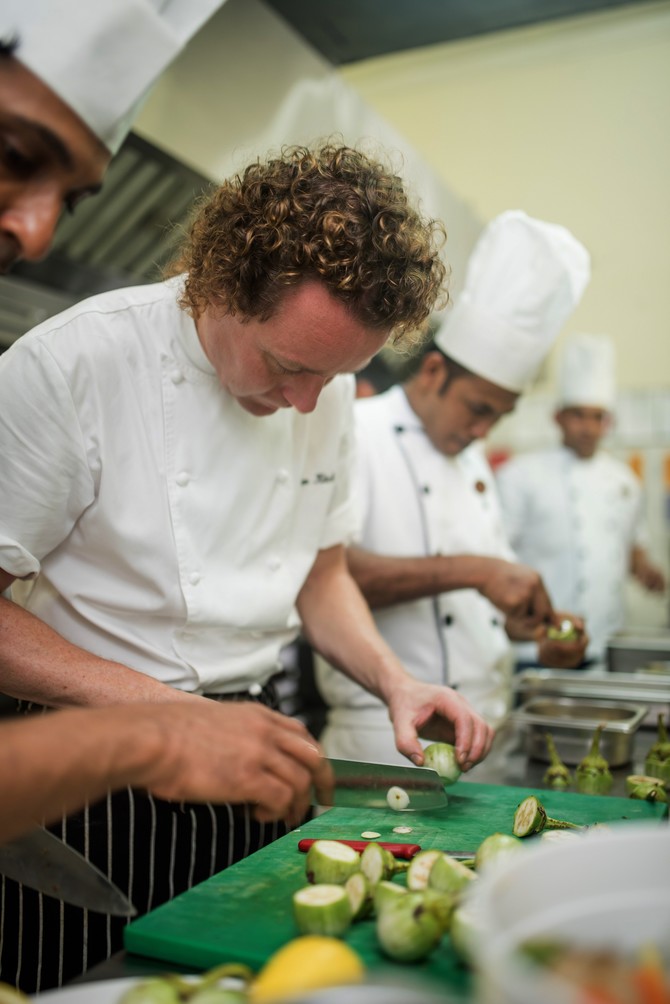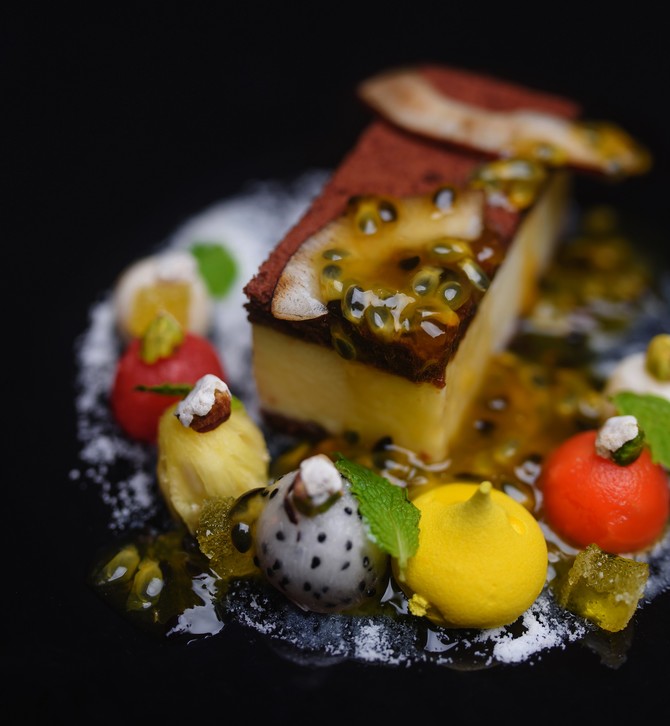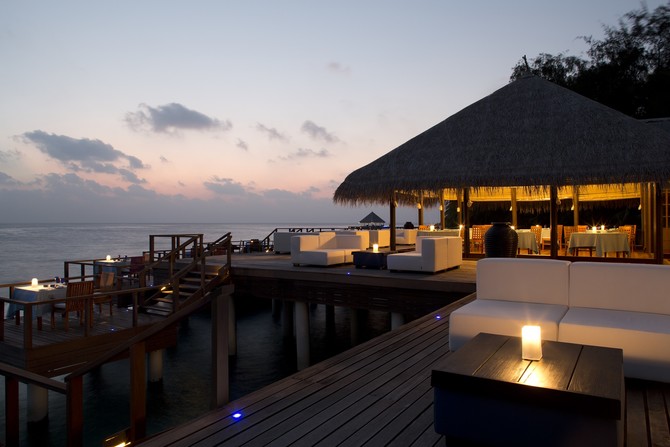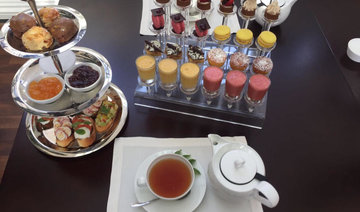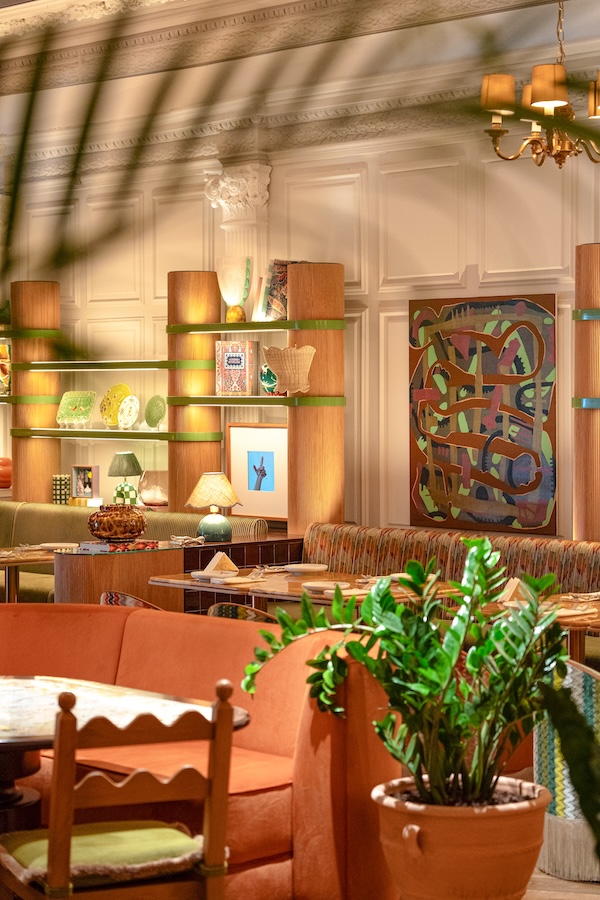BODU HITHI, The Maldives: A gentle breeze blew past as we huddled around our communal dining table while the waters gently lapped against the support pillars of the boardwalk restaurant we were in under a starlit sky. The conversation flowed easily, even if it was among strangers, as is wont to happen in such an idyllic setting, especially when accompanied by good food.
And the food we were indulging in was very good, to say the least. That was not surprising considering it was created by Tom Kitchin, the acclaimed chef running successful Michelin-starred restaurants in Scotland, who was responsible for this pop-up dinner experience at five-star luxury resort Coco Bodu Hithi.
You would not have guessed he had just landed a day prior, and apparently headed straight into the kitchen from the welcome pier after the long flight and speedboat transfer. “I always like to drop myself into different cultures and places and see how things work. It’s nice to take yourself out of your own comfort zone as a chef,” he said, explaining the genesis of the pop-up during a chat the next day.
Living up to his reputation for serving “honest food,” each dish in the four-course set menu was packed solid flavors, even if it looked like Michelin star-worthy art on a plate. A light starter of heritage tomato salad topped with poached langoustine and served with a delicate but delightful tomato consommé proved a worthy start to a meal in which Kitchin’s signature approach of letting the ingredients do all the talking was obvious.
When asked about how he translates his culinary style from Scotland to a Maldivian island, he explained: “It’s about keeping it lighter and fresher. I’m using a lot more olive oil, for example, and just cooking to the climate. I’m bringing the techniques that I normally use and combining it with the produce from here.”
This was evident in the second course, a fillet of John Dory served with courgette flowers and stuffed aubergine, and drizzled over with a light curry sauce, which added a local twist. “When I came here, I literally just went into the walk-in fridge, looked at what was available and tweaked the menu accordingly,” he revealed.
Even the main course of rack of lamb was given a Mediterranean inflection with its accompaniments of artichoke, tomatoes, olives and garlic. But the dessert course is where island ingredients really shone, in a nostalgia-tinged coconut ice cream sandwich perfectly complemented by tropical fruits served in the style of retro melon balls, with a garnish of sliced fresh coconut and candied pineapple adding that gourmet touch.
While curly-haired Kitchin may not be around on the island to cook these delicacies himself beyond the two-day pop-up, the good news is these signature dishes remain on the menu at fine dining restaurant Aqua, with the local kitchen team stepping up to cook the dishes.
In fact, being able to participate in this knowledge-sharing was one of the highlights for Kitchin. “For me, it was really rewarding to see the guys in the kitchen embrace what I was trying to do… They were so enthusiastic, taking notes, taking pictures, looking things up online,” he said. “In your professional life, when you’re able to start inspiring people, that’s one of the most beautiful things.”
Lucky for guests that the kitchen team lapped up the opportunity to cook with an award-winning chef as going forward, the resort will continue to offer more gourmet experiences. Whether it is celebrity chef pop-ups — Kitchin may be returning to source a richer variety of local produce — or culinary master classes, it is all part of the luxury all-villa property’s ongoing mission to bring Michelin-star chefs and next-level fine dining to the island.
According to Antony Paton, group general manager of Coco Collection Resorts, of which Coco Bodu Hithi is a part, “it’s all about experiences now. Of course people love to do things like seeing local islands, going fishing and so on, but they get excited about something different (such as) seeing a celebrity. So to get someone like (Kitchin) to come here and come up with these unusual dishes is great, as food is so important in a place like this.”
Kitchin agrees, saying: “Customers who come to a destination like the Maldives usually pay a lot of money for a luxury experience, and hotels are realizing they have to offer different things to add to the experience. I definitely think this is becoming more of a trend these days.”
The Maldives, with its cerulean seas and powder white beaches, needs little to sell itself further, especially when its natural beauty is perfectly complemented by resorts such as these, featuring luxurious accommodation in contemporary pool villas that maximize those unbeatable views, a plethora of activities that make the most of the setting, and personalized service.
With gastronomy as an essential part of the mix in a luxury destination such as this, Coco Bodu Hithi ensures that no gourmand is disappointed, even when no celeb chefs are at hand, with its offerings of modern Mediterranean haute cuisine at over-water restaurant Stars, fresh sushi and sashimi at Tsuki, and elegant seafood at Aqua.
So yes, you might come to the Maldives for the incomparably idyllic setting, but in the case of Coco Bodu Hithi at least, you may well end up staying for the epicurean experiences.
Prices for villas at Coco Bodu Hithi range from about US$950 to US$2,400, depending on size and season. The resort is located in the Male Atoll, a 40-minute speedboat ride from the airport. Visit www.cococollection.com for more information.


